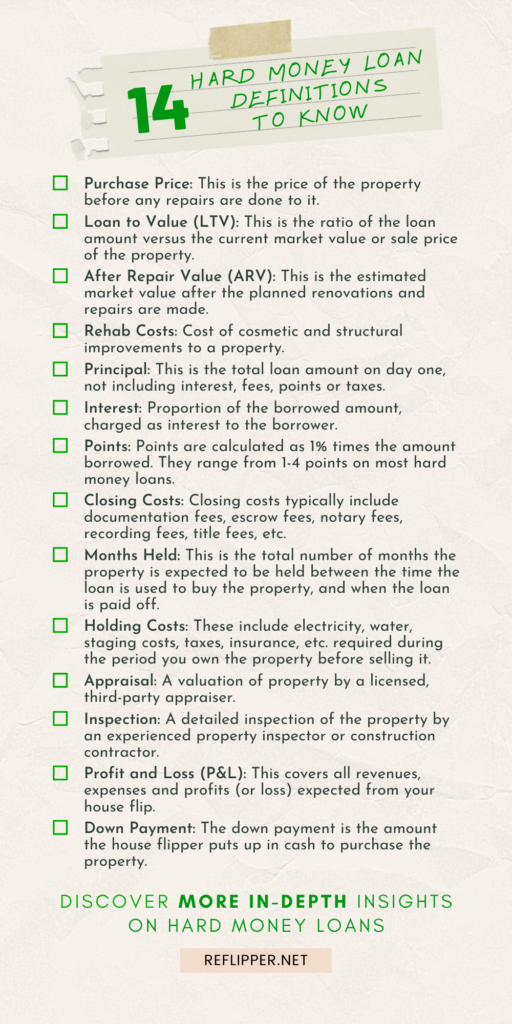In the world of real estate investing, hard money lenders have become a popular financing option for borrowers looking for quick and flexible funding. However, one common question that arises is whether or not hard money lenders require a property inspection before approving a loan. This article will explore this topic by highlighting the importance of property inspections, discussing the varying requirements of hard money lenders, and providing insights on how borrowers can navigate this process successfully. By understanding the role of property inspections in hard money lending, borrowers can make informed decisions and ensure a smooth loan approval process.
What are Hard Money Lenders?
Definition of Hard Money Lenders
Hard money lenders are private individuals or companies that provide short-term loans, typically with higher interest rates, to real estate investors. Unlike traditional lenders such as banks or credit unions, hard money lenders base their lending decisions primarily on the value of the property being used as collateral, rather than the borrower’s creditworthiness or income.
Benefits of Working with Hard Money Lenders
Working with hard money lenders can offer several advantages for real estate investors. Firstly, the loan approval process tends to be quicker and more streamlined compared to traditional lenders. Hard money lenders focus on the value of the property and the borrower’s investment plans, allowing for faster funding and closing timelines.
Additionally, hard money lenders are often more flexible than traditional lenders when it comes to loan terms. They may be willing to finance projects that banks consider too risky or unconventional, such as fix-and-flip properties or distressed properties in need of significant renovations.
Another benefit of working with hard money lenders is the ability to negotiate customized loan terms. Borrowers can discuss the interest rates, repayment terms, and other conditions with the lender to ensure they align with their investment goals.
Overall, hard money lenders offer a viable alternative for real estate investors who need quick financing solutions or have difficulty qualifying for traditional bank loans due to various factors such as credit scores or income documentation. However, before providing the loan, hard money lenders often require property inspections to assess the viability and value of the collateral.
Why Property Inspection is Important for Lenders
Understanding the Collateral
For hard money lenders, the collateral provided by the borrowers is of utmost importance. Since they primarily base their lending decisions on the value of the property, it is crucial for lenders to have a comprehensive understanding of the collateral’s condition, potential risks, and prospects for profit.
Property inspections provide lenders with valuable insights into the physical condition of the property. This includes evaluating the structure, foundation, plumbing, electrical systems, and other essential aspects. By understanding the collateral’s condition, lenders can determine the extent of repairs or renovations required, potential value appreciation, and potential risks associated with the investment.
Assessing the Property Value
Accurately assessing the value of a property is essential for hard money lenders. Understanding the property’s current value and potential future value allows lenders to determine the maximum loan amount they are willing to provide. Property inspections provide lenders with accurate and up-to-date information on the property’s value, taking into account factors such as location, market trends, demand, and comparable property sales.
By assessing the property value, lenders can ensure that their loan-to-value (LTV) ratio remains within acceptable limits. A lower LTV ratio reduces the lender’s risk exposure and increases the likelihood of recovering the loan amount in case of default.
Evaluating Repairs and Renovations
Hard money lenders need to assess the repairs and renovations required for a property before providing financing. Property inspections help lenders identify any existing issues or potential hazards that may affect the property’s value and the borrower’s ability to successfully complete the project.
By evaluating the repairs and renovations needed, lenders can factor in the associated costs and determine the feasibility of the project. This assessment is crucial as it helps lenders understand the borrower’s investment plans and ensure that the loan amount requested is justified based on the potential return on investment.
Hard money lenders rely on these property inspections to make informed decisions about loan approvals, terms, and interest rates. Understanding the importance of property inspections, lenders carefully evaluate various types of property inspections to gather the necessary information.

Types of Property Inspections
Exterior Inspection
Exterior inspections involve a thorough examination of the property’s exterior features, including the roof, walls, windows, doors, landscaping, and overall structural integrity. Inspectors look for signs of deterioration, damage, or potential issues that could impact the property’s value or safety.
During the exterior inspection, inspectors also consider factors such as the property’s curb appeal, neighborhood condition, and overall location. These factors play a significant role in determining the property’s current market value and potential for appreciation.
Interior Inspection
Interior inspections focus on examining the property’s interior features, including the condition of floors, walls, ceilings, plumbing, electrical systems, heating, cooling, and ventilation systems. Inspectors evaluate the quality of construction, functionality, and potential repairs or renovations needed.
Inspectors also assess the property’s layout, room sizes, and overall livability to understand the potential desirability for future buyers or tenants. This information helps lenders gauge the property’s marketability and profit potential.
Home Inspection Report
A home inspection report consolidates the findings from both exterior and interior inspections. It provides a detailed overview of the property’s condition, including any defects, repairs, or potential issues. The report may also include recommendations for repairs or renovations.
Home inspection reports are crucial for hard money lenders as they provide a comprehensive assessment of the collateral’s value, potential risks, and profitability. Lenders use these reports to make informed decisions about loan terms, interest rates, and the overall viability of the investment.
Factors Influencing the Need for a Property Inspection
Loan Amount
The loan amount requested by the borrower often influences the need for a property inspection. Hard money lenders may require inspections for higher loan amounts to ensure that the collateral adequately justifies the loan. The higher the loan amount, the more critical it becomes for lenders to assess the property’s value and condition accurately.
Loan-to-Value (LTV) Ratio
The loan-to-value (LTV) ratio is another crucial factor that influences the need for a property inspection. Hard money lenders use the LTV ratio to determine the maximum loan amount they are willing to provide. A higher LTV ratio poses a higher risk for the lender, as it indicates a lower equity position for the borrower. In such cases, lenders often require property inspections to ensure that the property’s value supports the requested loan amount.
Borrower’s Experience
The borrower’s experience and track record in real estate investing can impact the need for a property inspection. Experienced investors who have a proven track record of successful projects are often trusted by hard money lenders, and inspections may be less stringent or not required at all. However, for inexperienced borrowers or those with limited real estate experience, lenders may insist on property inspections to mitigate potential risks.
Type of Property
The type of property being used as collateral also influences the need for a property inspection. Certain property types, such as distressed properties or fix-and-flip projects, may require thorough inspections to assess the repairs or renovation needed and ensure proper valuation. Properties in unique locations or with non-traditional features might also require inspections to accurately determine their market value.
Hard money lenders carefully evaluate these factors to assess the need for property inspections and determine the associated benefits.

Benefits of Property Inspections for Hard Money Lenders
Mitigating Risks
Property inspections play a crucial role in mitigating risks for hard money lenders. By assessing the collateral’s condition and potential issues, lenders can make informed lending decisions and ensure they aren’t taking on excessive risk. Identifying any existing repairs, structural problems, or hazards helps lenders evaluate the investment’s soundness and adjust loan terms accordingly.
Determining Loan Terms and Interest Rates
Property inspections enable hard money lenders to accurately determine loan terms and interest rates. By evaluating the property’s condition, repairs needed, and market value, lenders can tailor loan terms to match the investment’s risk level. Properties requiring extensive repairs or located in less desirable neighborhoods may warrant higher interest rates or shorter loan terms, while properties in excellent condition and sought-after locations may justify more favorable loan terms.
Building Trust with Borrowers
Requiring property inspections helps hard money lenders build trust with borrowers. It demonstrates the lender’s commitment to evaluating the investment’s viability and protecting the borrower’s interests. Inspections provide borrowers with an objective assessment of the property’s condition, eliminating potential disputes or misunderstandings down the line. This transparency fosters a stronger relationship between the lender and borrower, leading to increased confidence and future opportunities.
Property inspections are an integral part of the overall lending process for hard money lenders. To effectively conduct property inspections, lenders follow a systematic approach.
Property Inspection Process for Hard Money Lenders
Engaging Professional Inspectors
Hard money lenders engage the services of professional property inspectors to conduct comprehensive inspections. These inspectors are trained experts who specialize in evaluating the condition and value of properties. Lenders carefully select experienced and reputable inspectors to ensure accurate assessments.
Reviewing Inspection Reports
After completing the property inspections, professional inspectors provide detailed reports outlining their findings. Hard money lenders thoroughly review these reports to understand the property’s condition, potential repairs, and value. The reports help lenders make informed decisions about loan terms, interest rates, and the overall feasibility of the investment. Lenders may also consult with the inspectors to gather additional information or seek clarification on certain aspects of the report.
Negotiating Appropriate Loan Terms
Based on the information gathered from the property inspections and inspection reports, hard money lenders negotiate appropriate loan terms with the borrower. This includes determining the loan amount, interest rates, repayment terms, and any specific conditions related to the property’s repairs or renovations. Lenders use the property inspection findings to ensure the loan terms align with the investment’s risk level and potential profitability.
Following this process allows hard money lenders to make informed lending decisions, protect their interests, and mitigate potential risks. However, in some cases, lenders may explore alternatives to the traditional property inspection methods.

Alternatives to Traditional Property Inspections
Automated Valuation Models (AVMs)
Automated Valuation Models (AVMs) use advanced data analytics and algorithms to estimate a property’s value. They consider factors such as comparable property sales, market trends, and various data sources to provide an estimate. AVMs can be a quick and cost-effective alternative to traditional property inspections, especially for lenders who need to assess multiple properties within a short timeframe. However, AVMs may not provide the same level of detail and accuracy as physical inspections, particularly when evaluating repairs or renovations needed.
Broker Price Opinions (BPOs)
Broker Price Opinions (BPOs) involve real estate professionals providing their opinion on a property’s value based on their knowledge and experience in the local market. BPOs can offer a relatively quick assessment of a property’s value, making them a useful tool for hard money lenders. However, similar to AVMs, BPOs may lack the in-depth analysis and physical examination provided by traditional property inspections.
Comparable Sales Analysis
Comparable Sales Analysis involves evaluating recently sold properties in the same area to determine a property’s value. By comparing similar properties and their selling prices, lenders can estimate the market value of the property in question. Comparable Sales Analysis can provide valuable insights, but it may not account for specific condition-related factors or potential repairs needed.
While these alternative methods can provide lenders with some information about the property’s value, they may not offer the same level of comprehensive assessment as traditional property inspections. Therefore, hard money lenders often rely on traditional property inspections to make informed lending decisions.
Exceptions to Property Inspections by Hard Money Lenders
While property inspections are crucial for most hard money lenders, there are exceptions in certain cases. These exceptions may arise due to specific circumstances or strong borrower profiles.
Pre-Existing Lender Relationship
In cases where borrowers have an established relationship with the lender and a proven track record of successful projects, property inspections may be waived or less stringent. The lender’s trust in the borrower’s experience and reputation may mitigate the need for detailed property inspections.
Strong Borrower History
Borrowers with a strong history of successful real estate investments and a solid financial track record may also be exempt from extensive property inspections. Lenders may rely on the borrower’s past achievements and creditworthiness, allowing for a streamlined loan approval process.
Low Loan Amounts
In instances where the loan amount is relatively small, hard money lenders may choose to forego property inspections. Lower loan amounts pose less risk to the lender, and it may not be cost-effective to conduct full-scale inspections for such investments.
While these exceptions exist, hard money lenders emphasize the importance of property inspections as a standard practice to mitigate risks and ensure accurate lending decisions.

Challenges and Risks Associated with Skipping Property Inspections
While it may be tempting for hard money lenders to skip property inspections in certain cases, doing so can present several challenges and risks.
Unidentified Repairs and Issues
Without property inspections, lenders may overlook important repairs or potential issues with the property. This oversight can lead to underestimating the costs involved in bringing the property to marketable or rentable condition, resulting in financial losses for both the lender and the borrower. Identifying these repairs and issues through inspections helps lenders make informed lending decisions and accurately assess the maximum loan amount they can provide.
Overvalued Properties
Skipping property inspections can lead to overvaluing the collateral. Without a thorough assessment of the property’s condition and market value, lenders may rely on inaccurate or outdated information. Overvaluing the property increases the lender’s risk exposure, especially if the borrower defaults and the property needs to be sold to recover the loan amount.
Discrepancies in Collateral
Property inspections play a crucial role in identifying any discrepancies or misrepresentation of the collateral. Inspections help lenders ensure that the property being used as collateral aligns with the borrower’s claims. Without inspections, lenders may face difficulties in verifying the property’s condition and features, potentially leading to disputes and legal complications.
Higher Default Rates
Skipping property inspections can increase the likelihood of defaults and foreclosures. Undisclosed repairs, hidden issues, or inaccurate valuation can contribute to the borrower’s inability to complete the project successfully or generate sufficient returns. Property inspections help lenders assess the investment’s feasibility and minimize the risk of default.
Hard money lenders recognize these challenges and risks and, therefore, prioritize conducting property inspections to minimize potential pitfalls and safeguard their investments.
Conclusion
Property inspections are an essential aspect of the hard money lending process. They provide hard money lenders with crucial information about the collateral’s condition, value, and potential risks. By thoroughly evaluating the collateral, lenders can make informed lending decisions, tailor appropriate loan terms, and mitigate potential risks.
While alternative methods such as AVMs, BPOs, and Comparable Sales Analysis can offer some insights, they may not provide the same level of accuracy and comprehensive assessment as traditional property inspections. Hard money lenders understand the importance of property inspections in ensuring the viability and profitability of real estate investments.
In conclusion, hard money lenders require property inspections to protect their interests, mitigate risks, and make informed lending decisions. These inspections play a vital role in evaluating the collateral, determining loan terms, and building trust with borrowers. By conducting thorough property inspections, hard money lenders can navigate the complexities of real estate investing and contribute to the success of their borrowers’ projects.




